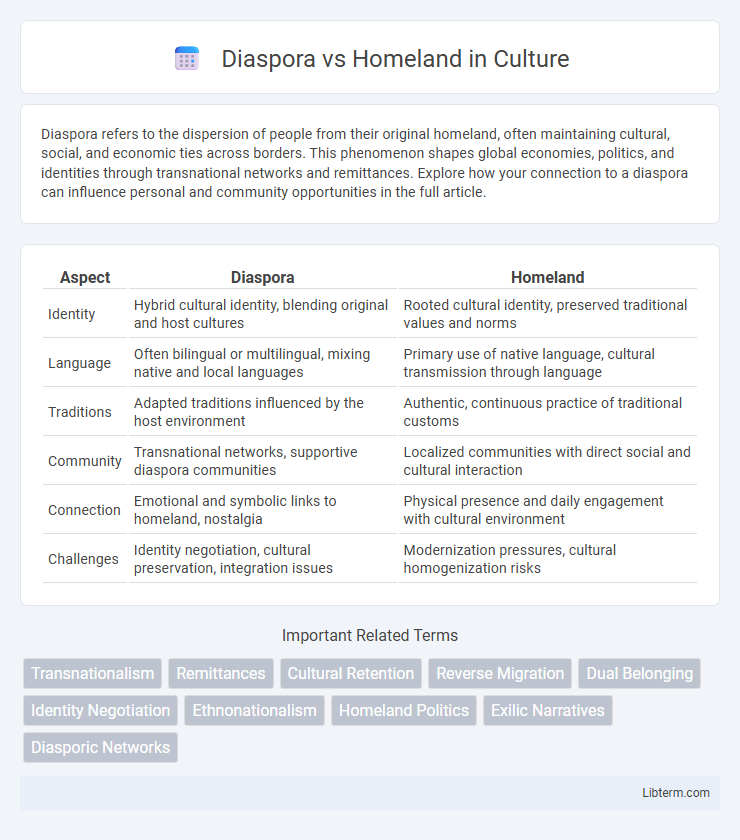Diaspora refers to the dispersion of people from their original homeland, often maintaining cultural, social, and economic ties across borders. This phenomenon shapes global economies, politics, and identities through transnational networks and remittances. Explore how your connection to a diaspora can influence personal and community opportunities in the full article.
Table of Comparison
| Aspect | Diaspora | Homeland |
|---|---|---|
| Identity | Hybrid cultural identity, blending original and host cultures | Rooted cultural identity, preserved traditional values and norms |
| Language | Often bilingual or multilingual, mixing native and local languages | Primary use of native language, cultural transmission through language |
| Traditions | Adapted traditions influenced by the host environment | Authentic, continuous practice of traditional customs |
| Community | Transnational networks, supportive diaspora communities | Localized communities with direct social and cultural interaction |
| Connection | Emotional and symbolic links to homeland, nostalgia | Physical presence and daily engagement with cultural environment |
| Challenges | Identity negotiation, cultural preservation, integration issues | Modernization pressures, cultural homogenization risks |
Defining Diaspora and Homeland
Diaspora refers to a dispersed population that originates from a specific homeland, maintaining cultural, social, and emotional ties despite geographical separation. Homeland is the original country or region where a group has historical, cultural, or ancestral roots, serving as a central identity anchor for members of the diaspora. The interaction between diaspora communities and their homelands shapes shared identity, transnational connections, and collective memory across generations.
Historical Context of Diaspora Movements
Diaspora movements trace back to ancient displacements, such as the Jewish exile from Babylon and the African slave trade, shaping global communities far from their homelands. Historical events like colonialism, wars, and economic upheavals intensified migrations, influencing the formation of diasporic identities and cultural retention. These movements reveal complex relationships between displaced populations and their homelands, impacting political, social, and economic dynamics worldwide.
Cultural Identity: Bridging Two Worlds
Cultural identity in the diaspora embodies a dynamic fusion of homeland traditions and host country influences, creating a unique hybrid that bridges two worlds. This intersection allows diaspora communities to preserve ancestral customs while adapting to new social environments, fostering a sense of belonging and resilience. Maintaining cultural practices such as language, cuisine, and festivals plays a crucial role in strengthening ties between diaspora populations and their homeland heritage.
Emotional Ties: Nostalgia and Belonging
Emotional ties in diaspora communities are deeply shaped by nostalgia, where memories of the homeland evoke a profound sense of identity and longing. These affective connections foster a dual sense of belonging, intertwining the culturally rich past of the homeland with the lived experiences of the diaspora. The interplay of nostalgia and belonging anchors diasporic individuals emotionally, influencing their social cohesion and cultural preservation.
Economic Contributions and Remittances
Diaspora communities significantly boost the economies of their homelands through remittances, which often surpass foreign direct investment and official development assistance in volume. These financial transfers support household consumption, education, healthcare, and small businesses, fostering local economic development and poverty alleviation. Moreover, diaspora entrepreneurship channels knowledge, technology, and international market access back to the homeland, further stimulating sustainable growth.
Challenges of Integration and Assimilation
Diaspora communities face challenges integrating into the homeland due to cultural differences, language barriers, and social prejudices that impede full assimilation. Limited access to economic opportunities and political representation further hinders their ability to establish a sense of belonging. These obstacles often result in identity conflicts and social marginalization within the host country.
Homelands’ Perceptions of Their Diaspora
Homelands often view their diaspora communities as vital sources of cultural preservation, economic support, and political influence, reinforcing national identity across borders. These perceptions shape policies encouraging diaspora engagement through investment incentives, voting rights, and cultural programs, reflecting a recognition of diasporas as strategic partners in homeland development. Tensions can arise when homelands expect diaspora loyalty or financial contributions, highlighting complex dynamics between identity, responsibility, and influence.
Role of Technology in Connecting Diaspora and Homeland
Technology plays a crucial role in bridging the gap between diaspora communities and their homelands by enabling instant communication and cultural exchange through social media platforms, video calls, and digital forums. Online networks facilitate the preservation of cultural identity, allowing diaspora members to participate in homeland events and political activities remotely. Moreover, digital tools provide economic opportunities through remote work and investments, strengthening transnational ties.
Political Influence of Diaspora Communities
Diaspora communities exert significant political influence on their homelands through lobbying, remittances, and transnational advocacy networks that shape policy decisions and diplomatic relations. Their engagement often amplifies minority rights, democratic reforms, and conflict resolution efforts in countries of origin, leveraging global platforms and foreign governments. The political power of diaspora groups is strengthened by their economic contributions and ability to mobilize international support, impacting homeland governance and international perceptions.
Future Trends in Diaspora-Homeland Relations
Future trends in diaspora-homeland relations emphasize increasing digital connectivity through virtual platforms and blockchain innovations, facilitating stronger economic and cultural ties. Migration patterns influenced by climate change and geopolitical shifts will reshape diasporic networks, prompting governments to enhance diaspora engagement policies and investment incentives. Enhanced data analytics and AI-driven diaspora mapping enable targeted outreach and tailored development programs, optimizing the socio-economic impact of remittances and knowledge transfer.
Diaspora Infographic

 libterm.com
libterm.com